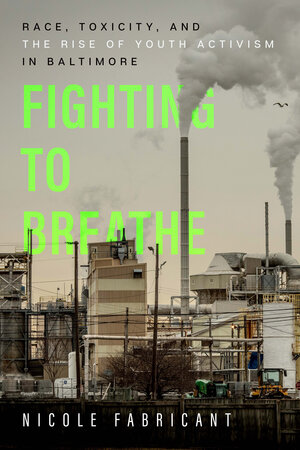By Nicole Fabricant, author of Fighting to Breath: Race, Toxicity, and the Rise of Youth Activism in Baltimore
My work as an activist anthropologist has evolved out of a desire to combine my commitment to scholarship with creating mutual aid, support systems, and resources for poor people. I grew up in Elizabeth New Jersey—a working class and first generation Latinx community— which shaped the evolution of my commitment to social justice. In my most recent book Fighting to Breathe, I track the experiences of growing up in Elizabeth surrounded by factories and industrial pollution. The present story-telling is in a constant conversation with what Elizabeth taught me about deeply feeling my race (white) and my class (middle). My parents sent me to public schools. The schools were too often academically limited, while at the same time, teaching me outside the classroom about structural inequality and the importance of building allegiances across race, class, ethnic, and gendered difference. All my childhood friends migrated to the United States from Latin America. Their parents worked manual labor jobs inside factories to give their children opportunities they missed. My first encounters with the violence and brutality of low wage labor happened inside the homes of my dear friends when speaking with their parents.
My journey into academia and into anthropology has always been intertwined with my Elizabeth roots. I have worked recently at a public university to inspire young people from similar communities to think critically while becoming engaged in movement work. Teaching anthropology at Towson university in Maryland with first generation college students, similar to so many of my high school friends better enabled me to find the language and stories to to understand systems of inequality and how we are all entangled in these structures.
When I moved to Baltimore in summer of 2011, I immediately found Free Your Voice (a youth movement in South Baltimore fighting for environmental justice).. These tireless and often brave high school students were evolving a campaign to oppose the intention to build the nation’s largest trash to energy incinerator one mile from their highschool in an already overburdened community. In the beginning, I folded myself into their daily organizing work, chauffeuring students to events and protests and supporting their work whenever I saw opportunities to amplify their voices. I have seen and been a part of the their shifting from a reactive to proactive campaign—from stopping one polluting industry to redefining development and land use when working in communities under attack. Like my parents, I was never satisfied with a model of scholarship that stayed close to the political sidelines; I also understood that risk was central to my larger commitments. I was a co-founding member of the South Baltimore Community Land Trust (SBCLT) which during the Covid19 pandemic claimed autonomy from The Worker Justice Center a 501 (c) (3) which was working on housing and social justice issues. We formed an accountability team to hold founders of the the Worker Justice Center accountable for abuses (racial, sexual) within the organization. It would have been easy to step aside or to say that this was something that my comrades could handle. However, witnessing such abuses inside spaces that used a language of justice impelled us through writing and organizing to hold the organization accountable, and eventually to split and create an autonomous organization. My comrades lost their jobs and healthcare during the Covid19 pandemic. I was threatened verbally and accused of being a traitor.
I am an activist anthropologist. And this commitment doesn’t come from studying movements, although I have learned much from movement scholars. For me, it is about the pain of living inequality; it is about a fire inside to build and create a more just world collectively. My commitments to justice stem from my lineage. My passion stems from my connections to my father and his family and his bouts with welfare hotels and homelessness as a child.and friends from high school, and beyond who travel with me to this day. I cannot write from a distance; I cannot teach from a distance and I certainly cannot organize from a distance.
My involvement in this Baltimore-based movement is about political and justice commitments over the long haul. The stakes are higher now than ever before: we are experiencing climactic crisis and our unsustainable resource extractive system will not provide safety for anyone, even the rich. We continue to rely upon outdated models of fossil fuel extraction and petro-chemical expansion which ultimately are destroying (air, waterways, soils, and the ecosystem) and our ability to live on this planet. Our battles are about survival and the universal threat to thriving on this planet. It is not enough to write, to analyze, and to think. This is about an anthropology that sees no boundaries between the academy and the fight; the ideas and the theories that come out of a long Marxist and other political traditions that demand our involvement. And as the great Brazilian theorist of education Paulo Freire suggests we can help to remake the world by naming it. If the Left is to have any chance of building the world we want to see, it will of course take all of us risking and applying our economic and cultural capital in this political struggle. Nothing in my estimation is more important in this moment.
